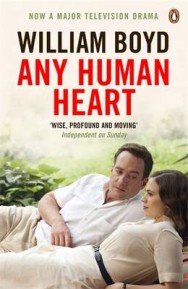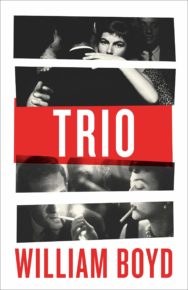‘Boyd has always had a wonderful ability to place his characters very precisely in the past and that is very much the case here.’
David Robinson enjoys the comic capering in William Boyd’s latest novel, Trio, set against the backdrop of an ego-strewn film set and the changing social mores of the 1960s.
Trio
By William Boyd
Published by Viking
1968. Across the Channel, rioting students are taking on the government. On the other side of the planet, the Americans are mired in the Vietnam War. In Brighton, meanwhile, the Sixties are swinging by in comparative peace, and filming has just started on Emily Bracegirdle’s Extremely Useful Ladder to the Moon. There’ll be a nude scene tomorrow with its two stars, the beautiful American Anny Viklund and home-grown pop star Troy Blaze.
We’ll be on or near the filmset for almost all of Trio, William Boyd’s 16th novel, a deliciously black comedy that takes us inside the heads of three characters – Elfrida, an alcoholic novelist married to the film’s director; Anny, the film’s star, who seems to have fallen foul of the CIA; and Talbot, the film’s producer, whose job seems to consist entirely of preventing the whole enterprise from unravelling.
Although Boyd has written about film-making before in The New Confessions (1986), that novel ranged panoramically across continents and most of the 20th century. Here the focus is both tighter (in its time scale) and looser (the three-way story split). We’re not looking – as we were in the earlier novel – at the rise and fall of art forms (silent movies, B-westerns) but at the sheer grind, greed and grubby compromises involved in the shooting of a single film.
Boyd knows more about film-making than most novelists, having directed one himself (The Trench, 1999) and written more than 60 scripts for film and TV, including the BAFTA-winning adaptation of his 2002 masterpiece, Any Human Heart. Of those 60, about 20 have actually been made – a 1:3 success rate which is unusually high in the screen trade. So he knows all about why movies implode or fail at the box office, and the novel reflects his knowledge of the pitfalls, extravagances and workarounds that are all part of most film shoots.
The star of this behind-the-scenes story is producer Talbot Kydd. The pressures on him are many and varied: the director who goes behind his back to make sure his girlfriend is hired as a writer; the pop star’s gangsterish managers; or a co-producer trying to finesse valuable film rights away from him. He has grown used to coping with far more, in a job that seems to consist of cosseting his stars, dealing with drugs, divorces, punch-ups, drunkenness, scene-stealing, one-upmanship and ‘generally the sort of behaviour that a three-year-old would be ashamed of’.
Unbeknown to Talbot, Elfrida, the director’s wife, is falling apart. It’s been ten years since she wrote her third novel, her writer’s block growing ever wider as she sinks into alcoholism. Maybe the seeds of it were there right at the start of her career, when she was heralded as ‘the new Virginia Woolf’ – an epithet she is unable to shake off, even though she can’t stand Woolf’s novels. Finally, she has an epiphany: she realises the will only be able to write if she kills off Woolf in her own fiction, so she starts writing about the summer’s day in 1941 in which Woolf waded into a river weighted down by stones. That happened only about 15 miles from Beachy Head, where Elfrida’s husband sets the denouement of his film, in which his two stars prepare to do what we now know as ‘a Thelma and Louise’ over the East Sussex cliff. Suicide – both fictional and real – is in the air.
Boyd has always acknowledged the influence of Evelyn Waugh – the ‘glittering, malevolent brilliance’ of early comedies more than his later works – and there are indeed strong echoes of it in the Elfrida chapters. She drinks remorselessly, lying about it all the time, yet here at last is a way out. Why, she wonders, has it taken her so long for this recension? She looks it up. No, wrong word. Recessional? No. ‘”Transfiguration” was the word she needed. It had been a transfiguration, a transformation, something beautiful, sublime had happened – a metamorphosis.’
Boyd tells Elfrida’s story in the third person, but it is written so closely that it might just as well be first. On page one of Trio, the waking Elfrida notices the sun ‘printing a skewed rectangle of lemony gold light onto the olive green-flecked wallpaper close by her pillow’. And when Woolf wakes up on her last day on page one of Elfrida’s novel, exactly the same rectangle of sunlight and design of wallpaper reappear. This is Boyd doing what he does best: playfully crossing and recrossing the line between fact and fiction so often that it starts to blur. He shows us the opening paragraphs in Elfrida’s novel, constantly being rewritten as the vodka takes hold. We will see her stumbling about on her research, wondering, for example, whether Virginia ever used a Hoover. This is great comic writing, not least because it sometimes bring us up short, like when she spots an old man in the garden of Woolf’s house and asks if she can come in and explains why she wants to. The old man, she realises later, in a scene that is pure Waugh – hard-edged, unsentimental, shocking – was Leonard Woolf.
Something else is going on in that scene. Although this is 1968, we are made to realise how close the world of 1941 remains. Leonard Woolf is reading the newspaper in his garden now, but his wife’s tragic death is presumably still within him. Similarly, the skies above East Sussex that feature in the rather ridiculous film Talbot is shepherding to a conclusion were, only a generation before, full of men trying to kill each other. Talbot’s own brother was one of them: his Spitfire crashed into the sea just three miles off the Sussex coast.
In the war, Talbot was a major in the Army. He was gay, but never acted on his impulses and instead married a nice Home Counties gal. But now the times are a-changing, especially for those who are, as they said back then, ‘light in the loafers’. Boyd has always had a wonderful ability to place his characters very precisely in the past and that is very much the case here. The 1967 Sexual Offences Act legalising homosexual acts between consenting adults has made a difference and a new gay club has just opened down the road in Brighton. The thought of going there has already crossed Talbot’s mind.
Of the titular trio, I shall pass lightest of all over Anny. Maybe she’s the reason the film is being made – a genuine American star of head-turning beauty – but she’s not the reason this novel will be read. True, she is fundamental to the plot’s more action-packed scenes and has her own secrets, but compared with Elfrida and Talbot she is just a pretty face. Yet that is unfair too: without Anny, there’s certainly no film and there mightn’t even be a novel.
It’s been a while since Boyd gave us such an obviously comic novel, and the scenes of Elfrida’s search for the real Virginia Woolf are a hoot. No doubt some readers will be disappointed that it’s not another Boydian epic in the mould of Any Human Heart, but they’ll be missing the point: instead of showing lives changing with the great sweep of the century, he is picking a seemingly inconsequential moment in time and describing the making of a definitely inconsequential film. But because Boyd is such a capacious novelist, there’s a lot more than that to it. Part thriller (Anny), part clever literary comedy (Elfrida), part subtle portrait of Sixties change (Talbot), part knowing homage to the zaniness of movie-making, Trio burns with brio.
Trio by William Boyd is published by Viking, priced £18.99.
ALSO IN THIS ISSUE

 The Book…According to Gavin Francis
The Book…According to Gavin Francis
‘And so I wanted to write a book that mapped the tension, the creative tension, between those extrem …

 The Mysteries of the Island of Thaara
The Mysteries of the Island of Thaara
‘As evening fell and the sun’s reflections on the waves turned into a bright rosy hue, I saw the isl …














